






|

|
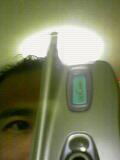 |
Today I start writing a personal diary. This is not an official life studies page, so I think I can write more freely about everyday events, thinkgs I saw, I heard, I ate(!), anything I want to write. And also I want to write some ideas on my research from time to time. My portable phone has a very small digital camera, so I can show you a picture of things around me, buildings, roads, flowers, people etc. The photo left is my portable phone and me. It looks big, but in fact it is fairly small. What is the light behind, UFO? (^_^)
I am not a native English speaker, so it takes lots of time to write English sentences. This is the *main* reason that the update of this site has been at such a slow pace. But, anyway, from this year I will try to update the contents more frequently than ever, so please visit here sometimes and check this diary and What'sNew section in this diary.
I am living in Osaka, Japan, the third largest city in this country. This city is a typical example of "Asian chaos," a mixture of deep Oriental things and sofisticated European/Tokyo style shops and cafes.
In fact, I am now in Tokyo, today, spending new year holidays here. It is cold here. And it is snowing.
What's New: About this site, What is life studies, and profile were thoroughly modified. |
 |
I went to a department store and found a lot of Sanrio stuffed animals sitting in a row. Splendid scene. Such creatures are deeply loved in Japan, and recently in East Asian countires, too.
This is the Japanese website (written in English) for Sanrio goods. They also have a website for the USA. Sanrio Wave has English, Korean, Chinese homepages. Does this mean Kitty-chans have already spread over the world? Hmmmm.
What's New: Links were modified. |
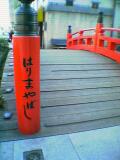 |
During the New Year's holidays I went back to Kochi prefecture to see my family. The photo, left, is a famous bridge, Harimaya-bashi (you can read six Japanese characters on the pole), in fact, it is no longer a real bridge, it is a symbol of the good old times of the area. You can see photos of Kochi Prefecture on the web.
Anyway, I added two websites on humanism, International Humanist and Ethical Union and American Humanist Association. Both are agnostic and seek to find meaning and value in life without the aid of traditional religions or gods. Well, their philosophy is interesting, and in a sense, similar to life studies. But I have a slight doubt about their belief in "science." In addition, life studies finds it important to have a dialogue between agnostics and religions, but what about those humanist groups? Probably, yes? Anyway, American Humanist Assciation's website is very sophisticated and easy to navigate. An example of a good website with a cool design.
What's New: LInks above websites added. |
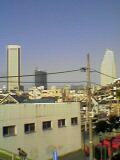 |
I went to Tokyo again this week to give a lecture on sex education(!) in a meeting for primary+junior high+high school teachers coming from around the country. I was not sure why I was nominated as a lecturer, but anyway, I talked about sex education, particularly about that for young boys, and my view of men's sexuality. I think I will write a new book on sex education someday, so this was a very good opportunity for me to think deeply again about this topic. Sex and sexuality are important topics for life studies. But, difficult topics because I still don't know what is "the good sex", "true sex", or "ideal sex." What do you think?
The photo is a view from Sangubashi station where the meeting was held. You can see three very tall buildings at Shinjuku.
What's New: New entries at Links. |
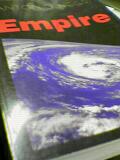 |
I have ordered the book, Empire, by Michael Hardt and Antonio Negri, and I have just recieved. This book has become a topic of conversation among philosophers and activists here since last year. I skimmed the book and found it very interesting, but I am not sure if I can agree with their way of thinking (Note: I am not a conservative). Their discussion seems to have a close connection with the book I am now writing. Their approach is in terms of political philosophy and my approach is in terms of philosophy of life. The translation of Empire will be published soon, so I think I will read it in translation first. Review by Ronaldo Munck.
Anyway, I really hope that the US will not attack Iraq....
What's New: Nothing. |
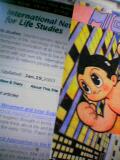 |
I am going to join a bioethics conference that will be held at Kyoto University in March. Scholars from Case Western Reserve University, USA, and Japanese clinical ethics specialists will have a discussion on various cases. The case I have in mind is as follows.
Case: Brain death and organ transplantation
A 17-year-old woman had a traffic accident and was sent to a hospital. She was diagnosed "clinical brain dead." In Japan, both a donor card and family consent are necessary in order to perform "legal diagnosis of brain death" and organ transplantation. The girl had a donor card. A year ago, the girl had said to her mother, "I have had a donor card. If I become brain dead and transplantation is successful, I will change myself into the organs and I will come to meet you. I am not sure how the person who would have my organs will come to meet you. The person may ask you the way, or ask you some money at a convenient store. In that case, please be kind to the person because the person is me." Even after the doctor explained about brain death to the mother and father, they continued believing that their clinically brain dead daughter was still alive because her body was warm and her heart was beating. The mother loved her daughter and wanted to respect her daughter's will to donate. However, giving consent means, for the mother, to "kill" her daughter who were still alive in the state of brain death. She couldn't make any decisions. She murmured that this was a hell on earth. The father, too, experienced great hardships and continued vomiting at home. In such a case, how can physicians and nurses support their decision-making and provide mental care for them? (This case is based on a true story occurred in 1999).
What do you think about this? (See Two Aspects of Brain Dead Being)
What's New: Nothing. |
|
